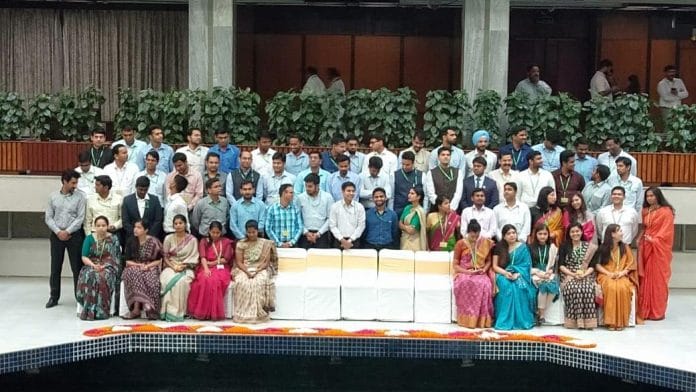New Delhi: Cracking the civil services examination may not have traditionally been one of the career goals associated with students from Delhi. However, at a time when there is growing criticism that the Union Public Service Commission (UPSC) exam is losing its pan-India character, the number of successful candidates from the national capital is going up.
In 2017-18, the number of candidates from Delhi who got selected to the Indian Administrative Service (IAS) was 17, a far cry from the mark of four set exactly 10 years before. This new number is ahead of much larger states like Bihar (12), Tamil Nadu (8) and Karnataka (6), all of whom had produced more officers than the city in 2007-08.
It’s not even as though 2017-18 was an exception — Delhi produced 12 IAS officers in 2016-17, nine in 2015-16, 19 the year before and 14 in 2013-14. Experts say in the previous decade, Delhi would produce four or five successful candidates every year.
States like Uttar Pradesh (28), Rajasthan (22) and Maharashtra (18) lead the way overall, as they have in the last few years.
Rising interest
A UPSC official who did not wish to be named said: “It is important to note that this change is taking place at a time when the overall intake of IAS officers is going down across the country.”
While in 2008, the UPSC selected over 240 IAS officers, the number has fallen to just 180 in recent years.
“But it is unlikely that the change reflects a change in the UPSC exam pattern… It is more likely that candidates from Delhi are showing more interest in the civil service exam now,” the UPSC official said.
However, some consider Delhi’s number to still be low, considering it is the “coaching hub” for the IAS.
“For too long, the number of people taking the exam from Delhi has remained low… Even now, just 17-19 people coming from the capital is low,” said Laxman Vaidwan, director of the Alchemist civil service coaching centre in Delhi. “But the numbers are surely going up, and there is more interest among children from Delhi to come for coaching right after class 12.”
Also read: India’s DGCA, snubbed globally, is a cosy club of IAS officers with no aviation expertise
Return to pre-1990s trend
Former coal secretary and education secretary to the government of India Anil Swarup said the rise of Delhi in the IAS is not a new trend — in fact, it is something that had fallen out of vogue but has now returned.
“Ten years may be too short a time to look at, because before the 1990s, Delhi was one of the states to produce a high number of IAS officers,” said Swarup, a 1981 batch officer who retired in 2018.
“With the opening up of the economy in the 1990s, what we saw was that people in Delhi started moving towards the private sector. Now, there is a reversal of that trend because people want to come back from the private sector to the government sector, and that is reflected best in the case of Delhi.”
‘English-speaking candidates from cities doing better’
According to Devendra Singh, national convener (competitive exams) for the RSS-affiliated Shiksha Sanskriti Utthan Nyas, Delhi’s rising numbers have followed changes in the UPSC exam pattern.
“It was in 2011 that the government first introduced the Civil Services Aptitude Test (CSAT)… Since then, not just Delhi, but English-speaking candidates from all urban centres are performing better in the exam,” he said.
“A decade ago, candidates from small universities and from small non-English speaking towns also used to be successful, and that is what gave an all-India character to the IAS. But that has changed now.”
According to an assessment made by the Nyas, over the last 10 years, the intake of candidates from non-English backgrounds has dropped from 48.4 per cent in 2008 to just 8.7 per cent in 2017.
UPSC officials, however, said the commission cannot verify these numbers.
Engineers dominate the IAS now
It is not just the geographical and linguistic profile of successful UPSC candidates that has begun to change, argued a 2018 batch IAS officer who did not wish to be named.
“Increasingly, one sees that candidates from an engineering background are dominating the IAS…This was not the case earlier,” the young officer, who is from a humanities background, said.
“This is odd because the UPSC exam actually evaluates candidates on their general knowledge skills, political sharpness etc.”
The increasing number of engineers in the IAS may have something to do with the fact that engineering is one of the most coveted choices after school, the officer said.
According to official data analysed by ThePrint, at least 40 per cent of the selected IAS officers over the last three years have been engineers.
Also read: Now, IAS, IPS, IFS officers will have to deposit gifts in museum Modi govt is setting up
Reforms needed
An official of the Department of Personnel and Training who wanted to remain anonymous said there is a need to introduce reforms in the UPSC exam.
“The UPSC should carry out an exercise wherein they study the profiles — regional, linguistic and educational — of the candidates they select,” the official said.
“It is important because on one hand, the government is pushing for domain expertise within the civil services, and on the other hand, it keeps taking engineers or doctors from similar backgrounds.”







I think you did not realise the fact the it’s ultimately Biharis who went to Delhi to crack the examination ???